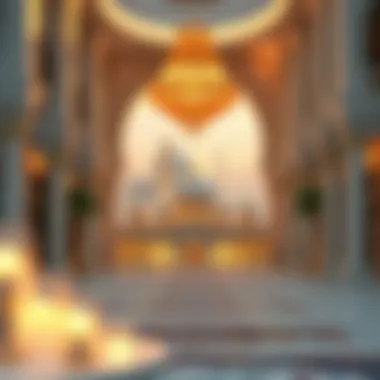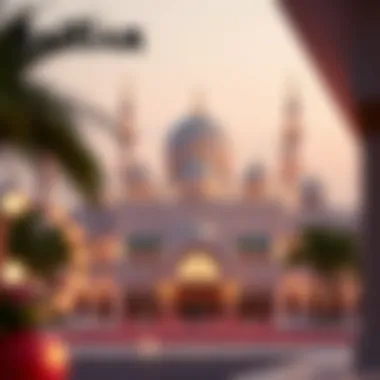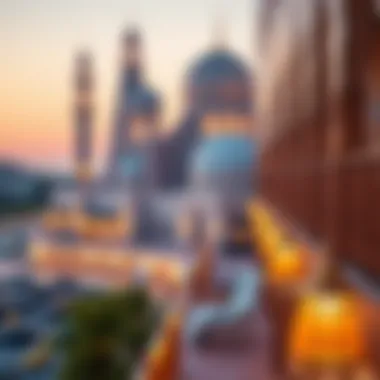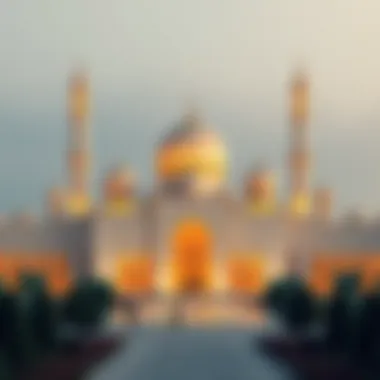Eid Al Fitr 2023 Holidays in the UAE: A Detailed Look


Intro
Eid Al Fitr marks the end of Ramadan, a month dedicated to fasting, reflection, and community. In the UAE, this holiday is much more than a simple celebration; it's a vital part of cultural and social fabric. It’s a time for families, friends, and communities to come together, share meals, and exchange gifts, reinforcing bonds that are so crucial in a rapidly modernizing society. As we dive into the observance of Eid 2023 in the UAE, we’ll see how this occasion shapes not only the spiritual landscape but also the economic dynamics, particularly in places like Dubai.
The UAE has become synonymous with spectacular festivities, vibrant community engagements, and significant economic shifts during holidays. This year's celebration carries an air of anticipation, having adjusted to post-pandemic realities. With businesses reopening and communities reviving their traditions, Eid Al Fitr 2023 promises to be a riveting showcase of both longstanding customs and contemporary flair. Let's unpack the details of this holiday, setting the stage for a deeper understanding of its relevance in today’s UAE.
When we talk about Eid, it’s essential to recognize the intricate layers that come into play. For investors and residents alike, the implications stretch from cultural observances to market trends that affect various sectors, particularly real estate. So, as we explore the significance of Eid Al Fitr, we will oscillate between local practices and the broader economic landscape, providing a holistic view of this important occasion.
Intro to Eid Al Fitr
Eid Al Fitr marks the culmination of Ramadan, the holy month of fasting observed by Muslims worldwide. Within this context, the holiday brings together families, friends, and communities, reinforcing social bonds through shared festivities. In the UAE, Eid is not just a religious occasion; it's a cultural blockbuster that significantly impacts various sectors. This introduction aims to illuminate the multifaceted layers of Eid Al Fitr, exploring the societal, economic, and emotional threads woven throughout the holiday.
Understanding Eid Al Fitr
At its core, Eid Al Fitr translates to "the festival of breaking the fast." It's an auspicious day that symbolizes gratitude and joy, celebrated on the first day of Shawwal, following the completion of Ramadan. Muslims worldwide engage in special prayers at mosques, share meals, and extend acts of charity, reflecting the spirit of generosity that defines this occasion.
One of the unique aspects of Eid is the emphasis on community and connection. In the UAE, this day is marked by various traditional customs, from donning new outfits to exchanging gifts, each act steeped in symbolism and significance.
Further, social cohesion is fostered as people unite to break their fast together, often in the context of large gatherings. Communities take this opportunity to reinforce local ties and celebrate shared values, making the day not just significant in a spiritual sense but also a vibrant celebration of cultural identity.
Historical Significance
Diving deeper into the historical roots of Eid Al Fitr, we find that it dates back to the time of the Prophet Muhammad, who established this celebration as a way to foster togetherness and reflection. The origins of Eid can be traced in the traditions mentioned in various hadiths that outline the Prophet's own observances of this festive day. Over centuries, Eid has evolved, but the core message of unity and gratitude remains intact.
In the UAE, the holiday's evolution intertwines closely with the country's modernization. While rooted in tradition, Eid celebrations have embraced contemporary elements, all while maintaining a strong homage to its origins. This blend of old and new provides a tantalizing glimpse into the cultural tapestry of the UAE, reflecting both its heritage and aspirations.
Eid Al Fitr serves not only as an end to fasting but as a time to affirm communal ties and cherish collective joy, an essence that resonates deeply within UAE culture.
In summary, understanding Eid Al Fitr is essential for grasping the rich cultural and social dynamics of the UAE. By delving into its understanding and historical context, we uncover the foundational aspects that make this holiday not just an event on the calendar but a pivotal moment for millions.
Eid Al Fitr 2023: Dates and Observances
Eid Al Fitr, the festival marking the end of Ramadan, is of immense significance in the UAE. This celebration symbolizes spiritual renewal, gratitude, and community bonding. Understanding the dates and observances of Eid Al Fitr 2023 sets the stage for recognizing how this holiday shapes various facets of life, including social interactions and economic activities.
Key Dates in
In 2023, Eid Al Fitr is expected to start on Friday, April 21, depending on the sighting of the moon. This date is crucial because it marks not just the conclusion of Ramadan, but also the initiation of celebrations that encompass various traditions. The last few days of Ramadan are characterized by preparations—cleaning homes, buying new clothes, and preparing festive meals. It is essential to keep an ear to the ground, as the exact date can slightly vary based on lunar observations.
Here’s a brief look at some significant dates:
- April 19, 2023: Anticipation of Eid with prayers and last-minute charitable acts.
- April 21, 2023: Eid celebrations commence, characterized by special prayers at mosques and gatherings.
- April 22-23, 2023: Continuation of festivities, often extending into community events and family get-togethers.
Understanding these dates not only helps individuals plan their celebrations but also allows businesses and service providers to prepare accordingly. For many, this is a time of increased activity in sectors like retail and hospitality, underscoring the holiday's impact on the economy.
Local Traditions and Customs


Local traditions surrounding Eid Al Fitr in the UAE are rich and varied. The essence of these customs lies in communal harmony and shared experiences. One primary tradition is the performance of Eid prayers, which congregates community members in large numbers at mosques and public places, fostering a spirit of togetherness.
The practice of Zakat al-Fitr is also significant. This mandatory charitable giving before the Eid prayer serves as a means of supporting those in need. It reinforces community bonds by ensuring everyone can share in the festive meals that follow.
Moreover, visiting friends and family is a custom that many Emiratis hold dear. People exchange sweets and gifts, symbolizing goodwill and affection. Traditional dishes like Mandi or Harees dot the tables during Eid feasts, reminding everyone of the cultural roots that tie them together.
In many households, preparing for the evening celebrations involves wearing new clothes—often traditional attire—that connects individuals to their heritage while modern touches reflect the evolving identity of UAE culture.
"Eid is not just a holiday; it’s a heartfelt reunion of generations, carried through shared meals and laughter."
As the holiday unfolds, social media plays an increasingly prominent role, allowing individuals to share their reflections and experiences from the day. This blend of tradition and modernity showcases how the past coexists with the present, enhancing the cultural tapestry of the UAE during this significant time.
By gaining insights into these dates and traditions, we not only appreciate the cultural festivities but also recognize how deeply embedded these practices are in the community's daily life, underlining the importance of Eid Al Fitr in the UAE.
Cultural Celebrations in the UAE
Cultural celebrations during Eid Al Fitr hold a significant place in the social fabric of the UAE. This unique event serves as a bridge connecting diverse communities, and encompasses a tapestry of traditions reflecting the nation's rich cultural mosaic. Celebrating Eid goes beyond the individual act of prayer; it fosters collective joy, solidifying community bonds across the emirates.
One of the biggest draws of these celebrations is the sense of belonging they create. Families, friends, and neighbors gather to share in festive activities that honor traditions, but also embrace modernity. The culmination of Ramadan’s fasting into a grand celebration illustrates a unique blend of the sacred and the joyous, resonating deeply with both locals and expatriates.
Community Gatherings
During Eid, community gatherings are vibrant and diverse. From bustling markets to quiet family homes, the UAE comes alive with activity. Many neighborhoods organize communal prayers, where men, women, and children come together, dressed in their finest attire. These prayers, held in large open areas or mosques, are an essential part of the celebration, allowing individuals to reflect on their faith while sharing the experience with others.
Moreover, initiatives often pop up in different emirates, aimed at larger community involvement. Events such as charity drives and cultural exhibitions emphasize the spirit of giving inherent in Islamic teachings. Popular spots like Al Seef in Dubai buzz with energy as whole families enjoy various activities. People gather to exchange greetings and well wishes, reinforcing a sense of community spirit.
Public Festivities and Events
Public festivities create a festive atmosphere that can be felt throughout the country. Well-planned programs span from fireworks in Abu Dhabi to musical performances in Sharjah. Each event aims to celebrate not just the religious significance but also the multicultural fabric of UAE society.
In Dubai, places like Burj Park serve as central hubs for events, featuring live music, art displays, and themed markets. The UAE also showcases its commitment to inclusivity, making sure that various nationalities come together to celebrate in peace. Localities set up food stalls, where families can share meals with friends, mixing traditional Emirati dishes with international cuisine.
"Eid celebrations in the UAE unite people from all paths of life, transforming diverse cultural tapestries into a unified joyous occasion."
Cuisine and Social Gatherings
Food plays a pivotal role during Eid Al Fitr, with families preparing traditional meals that reflect regional nuances. Emirati favorites like Harees and Mandi find their place beside delicious sweets such as Knafeh and Baklava. This culinary celebration brings people together, creating an ambiance filled with laughter and communality.
As families gather around the dining table, meals become a time for storytelling and reminiscence. There’s an unspoken joy in sharing dishes, each representing a cherished family tradition passed down through generations. Potluck-style gatherings are also common, where friends invite each other over to showcase their culinary skills and enjoy a delicious feast.
Eid further encourages socializing outside the home as places like cafes and parks become lively with people enjoying picnic-style meals amidst the warm weather. This blending of the sacred and social reflects the UAE's emphasis on community, reinforcing ties that are celebrated through habits of generosity and hospitality.
In summary, cultural celebrations during Eid Al Fitr in the UAE not only mark an important religious occasion but also serve as an opportunity for communities to come together, share experiences, and strengthen relationships. From community gatherings to food traditions, each aspect embodies a sense of unity that shapes what it means to celebrate in one of the world's most diverse nations.
Impact on the UAE Real Estate Market


Recognizing the tie between cultural observances and economic activities, Eid Al Fitr has a significant influence on the UAE real estate market. The holiday not only fosters community spirit but also spurs economic transactions, including property purchases and rentals. Investors, expats, and agents closely monitor the trends during this festive period, as certain patterns can be quite revealing about consumer behavior and market stability.
Historical Trends During Eid
Looking back through the years, there’s a notable correlation between Eid Al Fitr and real estate activity in the UAE. Past celebrations often indicate a spike in property transactions. For instance, in 2019, areas such as Dubai Marina and Jumeirah witnessed a flurry of activity post-Eid. Generally, festive seasons bring about optimism among buyers, encouraging them to act on long-held intentions of acquiring property. Traditionally, this period sees a temporary lifting of economic weights, with families looking to either upgrade, downsize, or invest.
- Increased inquiries and viewings.
- Price adjustments as landlords assess demand.
- Growth in short-term rental offerings, driven by local tourism and visiting family members.
Current Market Dynamics
In the present landscape, the real estate market in the UAE is primarily influenced by the broader economic recovery strategies that have been in place since the global health crisis. During Eid 2023, market dynamics suggest a cautious but optimistic approach among investors. With various government initiatives promoting a stable economy, buyers are weighing options carefully before committing. Key observations include:
- Rising demand in suburbs as remote work becomes standard.
- Increased interest in off-plan projects as developers offer attractive payment plans.
- Shifts in buyer profiles, with a mix of local and international investors eyeing diverse property types.
Despite cautious sentiment, the festive spirit encourages many to seek new beginnings through property acquisition.
Investment Opportunities During Eid
Eid Al Fitr opens new doors for savvy investors looking to capitalize on unique market conditions. As demand fluctuates, potential opportunities can emerge that align with personal and strategic goals. Some noteworthy prospects include:
- Short-term rental investments: Properties in popular areas can yield high returns, especially with families from abroad visiting during Eid.
- Discounted properties: Some landlords might offer reductions to fill vacancies ahead of the busy summer season.
- Long-term leases: Engage in negotiations around Eid when many landlords are eager to fill units, offering favorable lease terms.
- For example, short stays in Abu Dhabi or Dubai can fetch good rates.
Understanding these investment dynamics is crucial as expats, renters, and buyers navigate the post-Eid landscape. The success of these ventures depends largely on real-time market analyses and foreseeing potential changes, guiding wise decision-making for community-oriented investors.
**"In the ever-evolving game of property investments, timing during festive seasons like Eid can prove pivotal. Those who see the connections make informed decisions."
Employee Holidays and Business Implications
Eid Al Fitr is a pivotal moment for the UAE, not only as a time of celebration but also as a period that significantly affects the corporate landscape. Understanding the interplay between employee holidays and business implications is essential for organizations looking to navigate this festive season effectively. The holiday usually sees numerous employees take time off, influencing productivity, operational continuity, and even strategic planning for many businesses.
When employees are off for Eid, businesses experience a drop in workforce availability, which can lead to adjustments in project timelines and client interactions. Acknowledging the cultural significance of this holiday shows respect for the traditions of employees, which can enhance workplace morale and build a stronger company culture. This article will delve into the nuances of how Eid not only brings joy for families but also poses challenges and opportunities for organizations within the UAE.
Eid Holidays in the Corporate Sector
In many corporate settings in the UAE, the Eid holidays present a unique opportunity to strengthen employee satisfaction. Many companies offer extended leave around Eid, recognizing its importance culturally and personally. This move is not just altruistic; it also fosters loyalty and encourages employees to align themselves with company objectives. A few points to consider regarding the corporate sector during Eid:
- Increased Employee Morale: Time off during Eid allows employees to reconnect with family and community, which boosts their overall morale.
- Company Policies: Many organizations implement flexible leave policies around Eid to accommodate various cultural practices, showing adaptability and understanding.
- Holiday Pay Considerations: Employers often review their compensation practices to ensure fair treatment of employees during the holiday season which can significantly impact workforce motivation.
The trend among large enterprises and SMEs alike is to provide even more generous leave where feasible, as this can enhance the employer brand and attract top talent.
Adjustments in Business Operations
During Eid Al Fitr, many businesses find themselves needing to adapt their operations to accommodate the holiday spirit while keeping their doors open. Here are several adjustments companies might consider making:


- Altered Business Hours: Firms often adjust their hours during the Eid period to align with employee needs and local customs. Many may close early or start later depending on prayer times and cultural practices.
- Project Management: With team members away, businesses might need to prioritize tasks and manage workloads beforehand, ensuring that deadlines remain intact without overwhelming staff.
- Client Communications: Organizations must proactively communicate their holiday schedules to clients, setting clear expectations to avoid last-minute surprises.
- Remote Working Options: Some businesses embrace a more flexible working environment, allowing employees to work from home before or after the holiday, supporting their need for personal time without sacrificing business productivity.
In summary, navigating employee holidays and business implications during Eid requires a careful balance of respect for cultural practices and operational efficiency. Conducting an assessment of employee needs and organizational capacity during this period can enhance not only business responsiveness but also employee engagement.
“Embracing the spirit of Eid within the work environment cultivates a culture that understands and respects its employees’ cultural roots.”
By taking a thoughtful approach, UAE businesses can foster a harmonious atmosphere that supports both the festive mood of the holiday and the achievement of corporate goals.
Health and Safety Considerations
During festive periods like Eid Al Fitr, the intersection of celebration and safety becomes crucial. This segment serves as a guide for understanding the important aspects of health and safety that arise during this holiday in the UAE. With large gatherings and a slew of activities, ensuring public health and safety is paramount.
Public Health Guidelines
As the nation gears up for celebrations, adhering to public health guidelines is not just a necessity, but a collective responsibility. The UAE government is keen on maintaining health standards to ensure that everyone can partake in the festivities without the looming threat of illness. During Eid, the Ministry of Health and Prevention typically releases specific guidelines to follow:
- Hygiene Practices: Regular handwashing with soap and water or using hand sanitizers is encouraged, especially before meals.
- Vaccinations: Staying up-to-date with vaccinations, particularly against COVID-19 and flu, is advisable. Health officials might set up vaccination booths at various locations, making it easy for individuals to get jabbed before gathering.
- Sick Stay Home: Individuals displaying symptoms of illness should remain at home, respecting both their health and the wellbeing of others.
Moreover, many mosques and community centers will implement measures such as social distancing and mask-wearing in crowded spaces, aiming to prevent the spread of illness during the prayers and communal festivities— traditions central to the Eid experience.
Travel Safety During Holidays
Eid Al Fitr often sees an uptick in travel within the UAE, as families flock to their hometowns or popular holiday destinations. Understanding travel safety is crucial to ensure a smooth experience. Here are some safety tips to consider:
- Plan Ahead: Check road conditions and traffic updates. The Eid holiday can lead to heavy traffic, so planning your journey around peak times can save you a lot of hassle.
- Vehicle Maintenance: Ensure your vehicle is road-ready. Checking tire pressure, oil levels, and brakes before embarking on your journey is essential, especially during high travel times.
- Emergency Kits: It's wise to carry an emergency kit in your vehicle. This should include items such as first-aid supplies, bottled water, and snacks. You may not know when a delayed journey could throw a wrench in the works.
"Safety is not just the absence of danger, but the presence of vigilance."
- Public Transport: If you intend to use public transport, be mindful of your belongings and observe specific guidelines laid out by the transportation authorities. Keep distance during family outings as crowded transport can pose risks.
By maintaining these health and safety practices, participants can enjoy all the joys of Eid Al Fitr while being considerate of others and safeguarding their health. The emphasis on public health and safety during Eid not only promotes a festive spirit but also reinforces community values that the UAE prides itself on.
The End and Future Perspectives
Eid Al Fitr represents more than just a day of feasting and celebration. It highlights the strong social fabric and unity within the UAE. As we pull together the threads of this intricate tapestry that is Eid, it’s essential to reflect on both its immediate and long-lasting impacts on society, economy, and culture.
The significance of Eid is pronounced, extending well beyond family gatherings and festive meals. It embodies a spirit of generosity, compassion, and community spirit. This year’s celebrations act as a focal point, linking past traditions to future aspirations. In a climate where people are increasingly prioritizing relationships and well-being, particularly after recent global challenges, Eid fosters a sense of belonging. This shared experience has the potential to influence social policies and communal initiatives moving forward.
Long-Term Impacts of Eid Celebrations
Looking ahead, the long-term impacts of Eid celebrations in the UAE can be discerned on multiple levels:
- Cultural Cohesion: Eid reinforces cultural identity, especially among the expatriate communities. As diverse nationalities come together to celebrate, a greater appreciation for multiculturalism within the UAE is cultivated.
- Economic Boost: The holiday contributes significantly to local businesses. Retail sales can soar as families shop for new clothes, gifts, and food supplies. The spike in tourism, with visitors drawn to the UAE for its grand celebrations, creates promising opportunities for the hospitality sector.
- Social Initiatives: There is a marked increase in philanthropic activities during Eid. Non-profit organizations often see higher engagement levels as people give generously to charity. This trend can lead to enduring patterns of community involvement and support.
In summary, the celebrations of Eid Al Fitr extrapolate long-lasting effects that touch upon culture, economics, and social engagements.
Reflections on Cultural Identity
Eid is not merely a holiday; it’s a reflection of the cultural identity that thrives within the UAE. The rich traditions surrounding this holiday allow both citizens and expatriates to explore their roots and share them with others. Through feasting, exchanging gifts, and communal prayers, individuals connect with their cultural narratives. This powerful exchange fosters understanding and appreciation among the diverse populations residing in the Emirates.
Traditions such as Al Eidyah, where children receive money as gifts, are more than just festive acts. They signify the transference of heritage from one generation to the next. As expatriates contribute their own cultural elements to the celebration, a new hybrid identity emerges, enriching the UAE’s already bustling cultural landscape.



